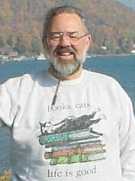 Paul Lareau
Paul Lareau
Genealogical Privacy
Genealogical Privacy - A Contrarian's View by Paul Lareau <paul(at)lareau.org>
I suspect that the following opinion will aggravate many people, but it is an issue that we all eventually confront, and address as we each see fit. The objections of a few people to having family information made public has been a problem in genealogy for as long as records have been kept. The complaints against putting information on the Internet are the same as those expressed 50 years ago by people who found personal family information in published books and articles. It is simply a matter of degree.
As any good information security advisor will tell you, if you have
knowledge of something that you do not want made public, don't tell
anyone! This is not just for genealogical information, but anything you
wish to keep secret. Especially in today's world, never, never, NEVER
put such information in writing or in any electronic format, and that
includes email. The minute that the information is passed
electronically, for all practical purposes, it is now public
information whether you intended it or not! The recipient of email
information is very likely to pass that information to others who have
an interest, and each of those people are likely to repeat the process.
With the amazing growth of the internet, it is almost certain that
within about three or four "generations" of communication, someone will
publicly post that information having no clue that you intended it to
be a secret when you divulged it to someone else! Thus, my advice to
people who do not want information about themselves and their families
made public, don't give that information out, to me or anyone else!
That this is a divisive issue at this point in time is mostly due to how quickly information can multiply in this new "knowledge age". For genealogists, this has been a boon that we didn't even begin to foresee only a decade ago. It is possible to find somebody on the internet who is tracing virtually any family of European roots, and this is quickly moving into less well documented nationalities at a very fast rate. The downside, for some, is that it is suddenly possible for virtually anyone to find references to themselves and their families on the Internet if they know where to look. In another decade, if information trends continue at the current rate, and I believe they will, the presence of such information, no matter how much that disturbs individuals living today, will be taken for granted by virtually everyone.
Specifically for genealogists, I have a question. If genealogy is not for sharing information with others, why do we do it? What is the purpose? There are some who do it for medical reasons, but that is a very small minority. There is no prize given for collecting the most cousins or ancestors. Our biggest thrill is getting or providing the information that enables us or a cousin to solve their little "detective story" and/or to make other contacts with previously unknown cousins and genealogists also tracing the same lines. Genealogy, in my opinion, is for sharing, and without sharing, it has no purpose.
Some people suggest that information about any living people not be shared with anyone. I strongly disagree with this. Over nearly a half century of genealogical involvement, including the publishing of several major family books, a far larger number of people have complained that they and their families were left out of a genealogy that have complained that they were included. Even today, among those who contact me, only fewer than 1 person in every 100 is unhappy that they were included, compared with the other 99 who seek to correct or add information, even down to making certain that their newborn child or grandchild is documented. By automatically excluding living people by assuming they do not wish to be listed, genealogists anger far more people than they satisfy. And often, those who get angry at being listed will only be satisfied if they have a say over several generations of relatives, cousins, and siblings, some of which may well disagree with being excluded.
Another suggestion I have heard is not to publish or share any information for which you do not have expressed permission. That is utter nonsense. Understand that most hobby genealogists take the vast majority of their information from public sources, printed materials, and now, the Internet. It is very likely that the average genealogist has personally been in contact with far fewer than 1% of the individuals they have documented. In most cases, they haven't a clue where to find them.
My bottom line is a warning to anyone who wishes to exchange information with me. If you send me information, it will be shared with anyone who wishes it, and no attempt will be made to hide it. If you do not feel comfortable with this attitude or want to hide family secrets, do not share them with me! I don't want to know, frankly, and I have no way to select out individual people or facts other than not including them in the first place. Keep your secrets to yourself, please.